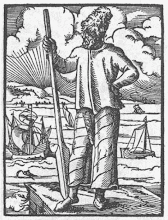“A Man for All Seasons” is written with distinction. It combines in equal measure the dancing, ironic wit of detachment, and the steady blue flame of commitment. With its commingling of literary grace, intellectual subtlety and human simplicity, it challenges the mind and, in the end, touches the heart. For it is not only about a man for all seasons but also about an aspiration for all time. . . .
Because the nature of Sir Thomas More deepens rather than alters and because his emotions are merely suggested in the quiet sparkle of his mind, the role is enormously exciting.
—Howard Taubman, NYT, Nov. 23, 1961
That was then. This is now:
Is it heresy to whisper that the sainted Thomas More is a bit of a bore? Even Frank Langella, an actor who can be counted on to put the pepper in mashed-potato parts, doesn’t find much variety in the monolithic goodness of the title character of “A Man for All Seasons,” Robert Bolt’s 1960 biodrama about More’s road to martyrdom during the reign of Henry VIII. . .
Cromwell is easily the most intriguing soul onstage. Now there’s a character Mr. Langella could sink his teeth into. Surely, it would be more rewarding than being the fixed if towering center of a shrine.
—Ben Brantley, NYT, Oct. 8, 2008
Back in high school I had the honor of studying under the great Mr. FitzGerald, and I remember one afternoon I stuck around his desk after school to discuss, inter alia, the Divine Comedy. Fitz, universally recognized as a great scholar and popularly viewed as something of a saint, argued that the last two cantiche were no less important than the Inferno. I wasn't going to disagree, but I rather callowly asked him why the holy seemed so much less "interesting" than the damned. And Mr. Fitz——I wish I could remember the words he used——pointed out more charitably than he needed to that if I found sin more interesting than God, it was hardly Dante's fault. If I remember rightly, he was also a big fan of A Man for All Seasons.


No comments:
Post a Comment